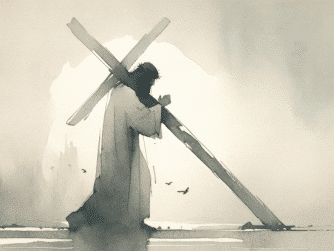Some church goers think they’re better than others, because they obey all the rules, thereby trying to win favor with God. This false sentiment is a Pharisaical disposition, where rule keeping is their personification of righteousness. This mindset was prevalent in the elder brother of the parable of the prodigal son. It also serves as a stark warning to mature church goers who have become pious in their attitude towards others. Join Carl now for part-two of this series, which confronts the religious strongholds of our heart…
Here is a complete transcript of the podcast…(below)
Friend, we are in the series from Servanthood to Sonship, and let’s pick it up right now live. So, the eldest son was about doing and obeying the rules but failed to realize his father’s love was unconditional not performance based or conditional. Some people in this room based on their parents think today the father in heaven is looking at your performance and he’s giving you gold stars based on it. No, that’s not how it works, okay? Now, we need to obey our father as an act of love. Yes, certainly. I’m not saying go out there and break rules. I’m not saying that. But, like I said, don’t in your mind keep going over these works and laws and goody-two-shoes gold stars and thinking that, you know, everything’s going to be okay. What you need to be doing is seeking your relationship with God. Number one, having a relationship with him is everything, right? Because the father valued relationship above all other things.
He couldn’t care where his other son had been. He couldn’t care how low he went into the mire. All he cared is that he came back and he had compassion on him and he loved him and said, oh my son, he was lost and now he’s found. That’s all he cares about. Friend, this is a parable right after Jesus talked about the lost coin, the lost sheep, and then he goes on to this parable, the prodigal son, a series of lost items. The focus is the father is seeking the lost. That’s his focus, amen? Now, we can all identify with a younger son. He didn’t value himself or his relationship with his father. As far as he was concerned, it’s about making it in the world. Give me my inheritance. Give it to me. You’ve been denying it this so long. I want the good stuff. Let me at it. The trouble is he had no discipline and he was eventually enslaved to his own passions, his own desires.
He went to Vegas. He probably ran the roulette and in two weeks it was all gone. He should have played, you know, 21s. I mean, you got more chance with that. Don’t take that advice, but I felt the anointing lift. No, I’m kidding. So, the point is that he went into the world so much that it was gone, all right? It’s about the heart, friends. You know, some people are like, you know, if I win the lottery, everything will be okay, but if you look at lottery winners, within about five years, it’s all gone and they’re in greater debt than when it began. That shows that it’s a heart issue, number one. Throwing money to a problem isn’t gonna solve it. In fact, it’s gonna make it worse because you have more opportunities to mess up, right? But he tried to search for fulfillment in worldly exploits. This is a typology of becoming born again after being lost in the world. There’s no fulfillment in the world. In fact, 1st John talks about being at enmity with the things of the world. We should be hostile to them because the Father’s not in them, right? You don’t hear that preached much.
And this younger son became captive to his passions because he didn’t have that closeness and structure that his father provided. He cast off all restraints and when you do that, friend, you’re gonna go into the pit. He ended up feeding unclean animals, wallowing with the pigs, being the lowest place for a Jewish man. He squandered God’s grace. His heart condemned him. He lost confidence in his sonship and then he’s decided to go back into the servant mindset and think, well, I’m no longer a son. My father’s gonna hate me or stone me. I mean, if you break the fifth commandment, you should be stoned to death. And so when I return, I’m in big trouble, right? That’s what he’s thinking. But the loving father was like, wow, he’s home, compassion, love. Come here, boy. Let’s kill the fatted calf. God’s grace, friend, is boundless. His mercy is boundless, amen? We don’t even understand it. We can’t fathom the goodness of God. Our minds can’t really grasp it, alright? But the younger son was left powerless and controlled by his sin nature. Now, let’s talk about the elder brother for a minute because we generally skip over this guy. Remember that both sons dishonored the father by asking for their inheritance before his death. This broke the fifth commandment. What’s interesting, though, if you study Jewish history, the firstborn received two thirds of the inheritance. The firstborn.
So this guy, he’s got more than the younger brother, right? Therefore, he has even less reason to be so upset and angry. He’s already received a massive portion. I would consider that to be ungrateful, right? If you’re just worried about the little fatted calf, right? The older brother was angered because the law recommended the younger brother be stoned for dishonoring his father, but the truth is they both dishonored him. The father reveals his love for the younger son by pouring out many blessings upon his return, and love conquered the law. How many of us have judged our Heavenly Father when things have not gone the way we wanted or planned in life, and we start questioning God’s goodness, and the enemy jumps on board and says, yeah, he’s not taking care of you. I mean, look how many good stuff you, good things, rather, you’re doing for God right now.
I mean, he’s not taking care of you. Hmm, question mark. The enemy uses that as a door, amen? Does he not? Do we get angry when God pours out his blessings upon a new convert? Have you ever seen someone get blessed? They just got saved. Great things are happening for them. Some other people have been serving God for five or ten years, and they’re like, man, what’s all that about? God can do as he pleases, amen? But he is faithful and just to everybody, and that’s a fact. Even if we view it as injustice, or even if we view it as unfair, the truth is the truth is the truth. He’s good, amen? Yep. So, we need to check our hearts, as we do regularly. Now, you could argue the Pharisee had a religious spirit, a pharisaical spirit, a judgmental spirit.
He resented his younger brother for not obeying the rules like he did. But Jesus was not impressed by the Pharisees’ performance-based religion and rigid adherence to detail. Remember, he would scold them regularly, because they missed the point, right? The law pointed to Jesus, but when he turned up, they rejected him. I’m the real deal, guys. I’m here. I’m the Son of God. All those scriptures are pointing to me, yet when I arrive, you want nothing to do with me, because I talk to the prostitute. I talk to the sinner. I talk to the harlot. I talk to the tax collector. I do all those things. Who do you think you are, Jesus? Luke 11:42, “But woe unto you Pharisees, this is the Lord Jesus speaking, for you tithe mint and rue and all manner of herbs and pass over judgment and the love of God. These ought you to have done and not to leave the other undone,” right? In other words, their tithing record was stellar, man, but they missed the love of God. Caring for everybody, caring for the sinner, talking to the sinner, having a heart of compassion, just as the father did. But their self-righteousness was a path they were building to God, but they could never get there, because their self-righteousness is never good enough, right? Our little checklist is never going to be good enough. Am I the only one who’s ever had a checklist? Yes, that’s a lovely story, Pastor. I can’t relate, but you’re doing very good.
True spirituality required the Pharisees to love the very tax collectors and sinners they despised, but greater condemnation awaited religious leaders for their misuse of God’s Word. They were using it for judgment. Their spirit was judgment. It was all judgment. Mark chapter 7, verses 6 through 8, Jesus is speaking, “This people honor me with their lips, but their heart is far from me. How be it in vain do they worship me, teaching for doctrines the commandments of men. For laying aside the commandment of God, you hold the tradition of men as the washing of pots and cups and many other such things you do.” The disciples went out, and they were eating the corn of wheat, and they would go off and eat, and then the Pharisees were like saying, hang on now, they didn’t wash their hands before they ate.
They were all about the washing and the outside, but their heart was off, right? Friend, check your heart tonight. Check your heart whether you’re in any way relating to the older brother tonight. Many people, like I said, focus on the younger brother in this passage, but they fail and skip over the elder. How many Christians do we know after five or ten years are looking down on new converts because, well, you know, they’re the way they are, you know, God bless them. God bless their darling heart, as they’d say in the South. Well, friend, we were like that someday, but then God turned us around, and then progressively we went through a process of sanctification, right? And we’re still going through that process, and we’re not going to look down on other people while we go through it, amen? So, you are a friend of God.
Be merciful. I am a friend of God, right? Somebody help me out. Henceforth, I call you not servants, John chapter 15. For the servant knows not what his Lord does. Wait a minute, a greater level of intimacy. He says the Lord is going to share with you things that he does because he’s called you a friend, yes? But I’ve called you friends for all the things that I have heard of my father I’ve made known to you. You’re a friend of God. Cindy, you’re a friend of God. Are you going to accept that tonight? Okay. Praise God. Noel, are you a friend of God? Have you talked to him recently? Because friends talk, right? They hang out. I haven’t heard from you in such a long time, girl. Some people will say that if they’re your friend. What’s up, man? Have you moved to another state? What happened to you? We need to check in with the Father. You’ve not chosen me, but I’ve chosen you and ordained you that should go forth and bring fruit and that your fruit should remain that whatsoever you ask of the Father in my name, he may give it to you. Again, the concept of asking. Friends ask, amen? That’s what they do.
They say, Lord, I’m in a pickle. I need help right now. I believe your word. I stand on it in Jesus’ name and I thank you for the answer. That’s faith. Simple as that. But if all of our conversation is merely asking God for stuff, from God’s perspective it could get pretty boring, right? Oh no, all I hear is, I want this and I want that. What about spending time saying, Lord, I thank you for just an awesome God that you are for all the things you’ve done in my life and just rescuing me from the pigs and eating the husks and bringing me back to my sound mind and restoring me whole, amen? A time of Thanksgiving is so powerful. If you spend five minutes just thanking God for what he’s done, you feel empowered.
You feel the anointing. It’s like, wow, I feel like I could ask for something else now. Oh, go on then. The Father says, oh, go on then. Go on then. Ask for something else, right? We bear fruit when we listen to the Lord and do what he says because we love him. Friends spend time with each other. A servant is paid to do what is asked, but a son will do these things because he loves the Father. His motivation isn’t stuff. Some people in Christianity will do all the stuff to get stuff. I’ll just perform this way and that way so I’ll get some good stuff from my Father God, the vending machine. No? No one like that? Is anybody, right? The vending machine has stopped working. I need to check in with the Father. The elder brother was a good boy who did everything right but lacked mercy in the critical hour. How many brothers and sisters in this room can you relate? Oh, I bet you could give me names of the elder brother who was so good he never did anything wrong, right? No? That’s good.
But people like that tend to lack mercy because they’re doing everything right, right? Because they haven’t done anything wrong in their sight. They don’t really need mercy. But friend, even this thinking is wretched before God. Luke chapter 6, verses 36 through 37, “Be therefore merciful as your Father is merciful. Judge not and you shall not be judged.Condemn not and you shall not be condemned. Forgive and you shall be forgiven. If you don’t forgive, will you be forgiven?” No. No, you won’t. In fact, it says you’ll be handed over to the tormentors in a separate passage. Friend, that’s the end of part two of this message. The onus is on us to obey. Amen? We’ll pick it up again live tomorrow. Good night, God bless, and remember to spread the good news.
https://www.calledoutinkansas.com/2014/02/17/sonship-vs-servanthood/
https://carljosephministries.com/podcast/psalm-2-end-of-globalism/
Title: From Servanthood to Sonship: Part 2 (LIVE)
Related keyword searches:








